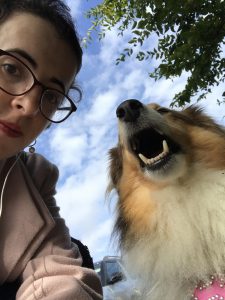

Lydia Wilkins is a twenty-one-year-old, NCTJ qualified freelance journalist with her work appearing in publications such as the Independent, Refinery 29 and many more. Two months shy of her sixteenth birthday, Lydia was diagnosed with Aspergers Syndrome which has led to her running a weekly newsletter to help and share information for freelancers who have a disability or Autism.
Empoword Journalism spoke to Lydia about her thoughts on women in journalism, the need for the industry to diversify further and more about her weekly newsletter.
Isabelle Raikes: How did you get into journalism? Is it a career you always wanted to do?
Lydia Wilkins: Journalism was always something I was interested in. Words have always fascinated me – how we use language, how to tell a good story, how to communicate quickly and clearly. While waiting to move to college, I filled out my ‘holiday time’ with work experience. A kind editor at the Daily Mail took me aside, and – I always joke ‘commanded me’ – to take an NCTJ qualification. After being accepted by the Journalism Diversity Fund, I did!
IR: What have been the biggest challenges of freelancing and do you have any tips on how to overcome these?
LW: As a disclaimer: freelancing is not actually something I wanted to do – a means to an end. Freelancing is challenging: I freelance as a journalist, but I also blog, run a newsletter, and work as an Autism trainer. I am also working on what others have called an ‘investigative story’ in my spare time. The biggest challenge is payment and earning enough – simply because you will spend a lot of time chasing payments. Keep a record that is clear and concise of all your transactions – invoices paid, to be paid, etc. Networking helps.
IR: Did you face any struggles due to being a woman in journalism?
LW: Yep. We probably all have…! At the start of lockdown, I listened to a lecture by a woman who researches barriers to employment for Autistic women. The main takeaway was that women who are Autistic, still have the gendered expectations they are ostensibly supposed to compile with. So, you may already struggle with eye contact and socialising – but you may be judged more harshly for not being a ‘team player’, for instance. Last year I had a job on the side to all my other roles – but was fired. I feel like my employer could have made the work environment far easier for me, instead of criticising me in the same way.
Among other things, safety is something I always look at. While I was training, #MeToo was the biggest story – and it shaped a lot of the media landscape I thought I knew. Safety for female journalists was also one of the most emphasised topics. There has been a lot of what I call ‘head patting’ – the “isn’t it nice, the little girl bought us a story!” that has led on to other issues like invites to hotel rooms or people I have never met wanting to buy me a drink – both things I have always said ‘no’ to – and sometimes odd behaviour that wouldn’t have been acceptable if I was male.
IR: Do you think the journalism industry is doing enough to employ women? Is there enough diversity in general in journalism?
LW: The short answer: no. To both questions.
From my perspective as an Autistic person, there is not enough diversity. Prior to becoming a journalist, I often felt cross and ashamed at some of the coverage of individuals on the spectrum which relied on stereotypes. (We are not Rainman! And we are not all likely to become a school shooter…!) Stories about individuals like me are also missed regularly – like the state of CAMHS, neurodiverse comedy nights and plays, etc.
Most of my editors have been male, whereas the women are usually in some subordinate position. I am not sure of any statistics, but I do not think there is enough women – there should be more. The NCTJ has a great report about diversity. Initiatives such as Press Pad, the Journalism Diversity Fund, and others are slowly changing the industry, bit by bit which is incredible. We are slowly getting there; a long way to go, but at least some people are trying.
IR: You mentioned how you produce a newsletter for disabled and autistic freelancers. Why did you feel this was important to create and what do you aim to achieve through writing it?
LW: My newsletter originally began as a means to an end. The current situation put a huge dent in my freelance income. Most freelancers are in the same position, falling through the cracks at times. It was also one of my goals this year to create a newsletter; I love receiving Freelance Writing Jobs, The Professional Freelancer (all newsletters) in my inbox during the week.
But it then took on a life of its own. I have a staggered sponsorship business model, where I have advertisers – but people subscribe largely for the resources. I have two sections: freelance resource – pitching guidelines and tweets, and Covid-19 resources, for people like me on the Autistic spectrum. I kept reading stories of how Autistic people have essentially sometimes been left to fend for themselves – like having to adapt to new routines, food, etc.
Journalism is lacking in diversity. Autistic people face ridiculous barriers to employment. I would like to change that, even if it is just a small way. I am raising a small amount via Ko-Fi to begin. I have been rejected for every grant I have applied for, so donations seemed to be the way to go.
IR: Are there any tips that you would like to offer to aspiring journalists?
LW: This is such a flattering question to be asked, thank you. Though I will say, I think I am the least qualified person to answer…! I have a mantra, courtesy of my grandparent: if you do not ask, you don’t get. Derren Brown wrote in his book about changing the stories we tell ourselves – and this is one way to do it, because what can go wrong? Using this has surprised me on occasion.
Talk to everyone. A woman who tutored me many years ago told me the most interesting person to talk to in a school is a librarian. They are always there, and see everything! They are firstly, a great confidant, and secondly, wonderful sources. Status of those in a room is not necessarily a great indicator of those who have or will make a great story. Always ask for contact details and follow up if you are at a network event.
Ask questions. I was presented with a joke certificate when I graduated for asking the most questions – and I laugh about it now. Nobody should make you feel inferior for asking the inane, boring questions – because you may have missed some small detail, after all.
Finally: care. It struck me when listening to a Paul Conroy podcast in which he described Marie Colvin as having died living – that he would never describe her as having died working. I have met reporters who just do not care – and I think stories get missed that way, and the copy suffers as a result. To be like that is what I try to hold myself up to.
If you want to see more of Lydia’s content as well as take a look at her newsletter, follow her socials below!
Instagram and twitter – @Journo_Lydia
Isabelle Raikes
Featured image courtesy of Lydia Wilkins.

